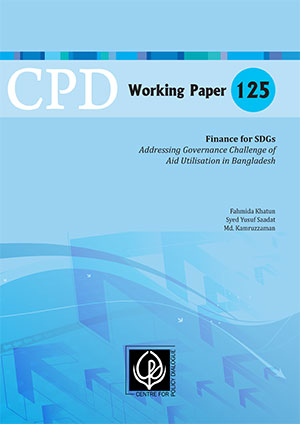 CPD Working Paper 125
CPD Working Paper 125
FINANCE FOR SDGs
Addressing Governance Challenge of Aid Utilisation in Bangladesh
Bangladesh’s upcoming graduation from least developed country (LDC) status, which may potentially take place in 2024, has generated renewed interest in the country’s ability to mobilise finance for development from external and domestic sources. Over the years, foreign aid received by Bangladesh has become more project specific, multilateral and loan-dominated. While the commitment and disbursement gap has been widening, Bangladesh’s overall dependence on aid has declined. Thus, it remains to be seen whether Bangladesh can fully transform from an aid-dependent to a trade-led economy. This study investigates the impact of foreign aid in Bangladesh, and attempts to uncover whether the development progress of the country can be sustained in the absence of foreign aid. A broad-based empirical analysis shows that, foreign aid is not a statistically significant determinant of economic growth in Bangladesh. However, a more disaggregated analysis reveals that, foreign aid to the health sector can significantly improve health outcomes. These findings show that, while foreign aid may not be a driving force of economic growth per se, it is still an important source of support for the social sectors of the country, which receive limited resource from the government. Hence, Bangladesh will have to improve the efficiency in aid utilisation. However, the country cannot expect to continue receiving foreign aid perpetually, and must prudently prepare for a gradual and systematic phase-out. Since graduation to a developing country status will make obtaining external finances more difficult and expensive, improving generation of domestic resources and their efficient use will be of critical importance for Bangladesh in the coming years.
Contributors: Fahmida Khatun, Syed Yusuf Saadat and Md. Kamruzzaman
Publication Period: May 2019
Download the Paper

